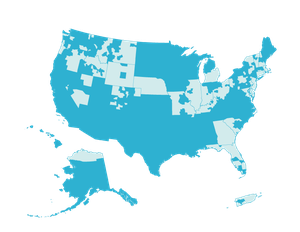The Farm Bill presents an opportunity to provide rural communities and people the resources they need to flourish. LISC’s Mark Kudlowitz and Nicole Barcliff examine where things stand in Congress and how the legislation can support the needs of families while also revitalizing communities that have long experienced capacity constraints that hinder community and economic development opportunities.
Smaller towns have long experienced capacity constraints that limit their ability to meet local goals. This is especially true for economically distressed small towns, which encounter difficulties applying for and receiving public and private resources due to under-resourced local governments and fewer overall community development organizations. Our Rural LISC team works on these issues daily with our community-based partners and provides training, technical assistance and funding to support their efforts. Experience has shown us that our work is most successful with our partners when all levels of government and private support are in place.
For community development practitioners, the Farm Bill is a critical piece of legislation whose programs not only address agricultural and food issues, but also help to connect rural communities facing economic challenges with essential supports and services. Renewed approximately every five years, it sets policies and resources for everything from farm subsidies to nutrition assistance to conservation, energy, and rural development.
For example, the Supplemental Nutrition Assistance Program (SNAP) and related SNAP Employment and Training Program are critical for ensuring food security for underserved people and helping lift families out of poverty. They have long been a focal point of advocacy for community and economic development practitioners. This year, negotiations also include exciting new opportunities to deepen and expand tools that address complex and interwoven factors confronting farms, rural families, employers, and workers. Among them are supports for child care and a proposed program that would increase rural community and economic development opportunities.
Child Care Needs in Rural Communities
Multi-sector collaboration is especially important to addressing the child care needs of rural communities. Child care businesses struggle to stay afloat due to high operating costs, low worker wages, and very thin profit margins. Sector-specific business challenges are exacerbated by rural place-based obstacles like low population density, lack of infrastructure and long distances between homes and places of employment. Together, these circumstances create a landscape in which rural families struggle to access affordable, high-quality care.
The good news is that Congress has been listening to the concerns of rural stakeholders and seems intent on prioritizing child care across several U.S. Department of Agriculture (USDA) programs in the Farm Bill. In fact, both the House Republican and Senate Democratic Farm Bill proposals incorporate provisions of the bipartisan, bicameral Expanding Childcare in Rural America (ECRA) Act, a bill that directs USDA to authorize and prioritize projects that address the availability, quality, and cost of child care in agricultural and rural communities. Many USDA Rural Development financial supports are just out of reach for a great number of rural child care businesses because they are not only highly competitive, but are also underfunded and over-subscribed.
LISC fully supports ensuring that child care businesses can be competitive in accessing USDA programs and applauds the bipartisan effort as an important first step. But prioritization alone will not adequately address child care challenges in rural communities. Lawmakers should also address the impact of inadequate facilities in order to expand high-quality care. LISC and the National Children’s Facilities Network recommend establishing dedicated federal resources for child care facilities as well as related technical assistance and capacity-building. The creation of a Child Care Facilities Financing Initiative (CCFFI) modeled after the successful Healthy Food Financing Initiative (HFFI) would leverage the expertise and resources of intermediaries and help bridge critical infrastructure financing gaps facing child care businesses.
New Rural Partnership and Prosperity Program
Congress is also considering creating a new Rural Partnership and Prosperity program through the Farm Bill, which would be administered by the USDA. This program is designed to provide the suite of resources necessary to increase community and economic development opportunities. First, USDA could provide multiyear grant awards to build the capacity of local partnerships working to attract private investment. Grants could support predevelopment activities, fund existing or new projects, and help coordinate other federal investments.
Second, USDA could provide assistance to help rural community organizations with grant writing and management, training, project development, and developing public-private partnerships. Creation of the Rural Partnership and Prosperity program would also include permanent authorization of the Rural Partners Network, which is an all-of-government approach to assisting small towns by embedding federal staff in these places and helping local organizations navigate federal programs. Lastly, it would also help streamline federal application processes and reduce administrative burdens, which have a disparate impact on rural places.
The House’s Farm Bill was approved by the House Agriculture Committee recently, and the Senate’s version is awaiting committee action. We call on Congress to pass a Farm Bill that provides robust support for underserved rural people and places, including increased resources for SNAP and SNAP E&T, and new resources to support child care, capacity building, and community and economic development for rural communities. This is the only way we ensure that no family or community is left behind.
About the Authors
 Mark Kudlowitz, Senior Policy Director
Mark Kudlowitz, Senior Policy Director
Mark advocates for federal policies which support multiple LISC national programs, including: Affordable Housing, Rural Development, and Transit Oriented Development. Before LISC, Mark worked as the Policy Director of the U.S. Department of Housing and Urban Development’s Office of Multifamily Housing Programs and also worked for over seven years at the Community Development Financial Institutions Fund at the U.S. Department of the Treasury. Mark managed affordable housing and community development programs at the District of Columbia’s Department of Housing and Community Development and held multiple positions at the Housing Assistance Council, a national rural affordable housing organization. Mark earned his B.A. from the University of Florida and M.S.W. from the University of Michigan.
 Nicole Barcliff, Senior Policy Director
Nicole Barcliff, Senior Policy Director
With two decades of public policy experience, Nicole Elizabeth Barcliff joined LISC in November 2012. As a Senior Policy Director, she advocates for federal policies that support LISC’s mission to forge resilient and inclusive communities of opportunity across America – great places to live, work, visit, do business and raise families. Nicole works closely with LISC national programs, LISC local offices, and a broad cross-sector of organizations to develop legislation and implement policy advocacy agendas that promote access to equitable opportunity in local communities. Her priority policy areas include safety and justice, health, and child care and early learning. Prior to joining LISC, Nicole held various positions that helped shape her federal policy expertise, including serving as Legislative Director for a member of Congress in the U.S. House of Representatives, Vice President for Education Affairs at the Motion Picture Association of America (MPAA), and Senior Associate for Government Relations at the Pew Charitable Trusts.
